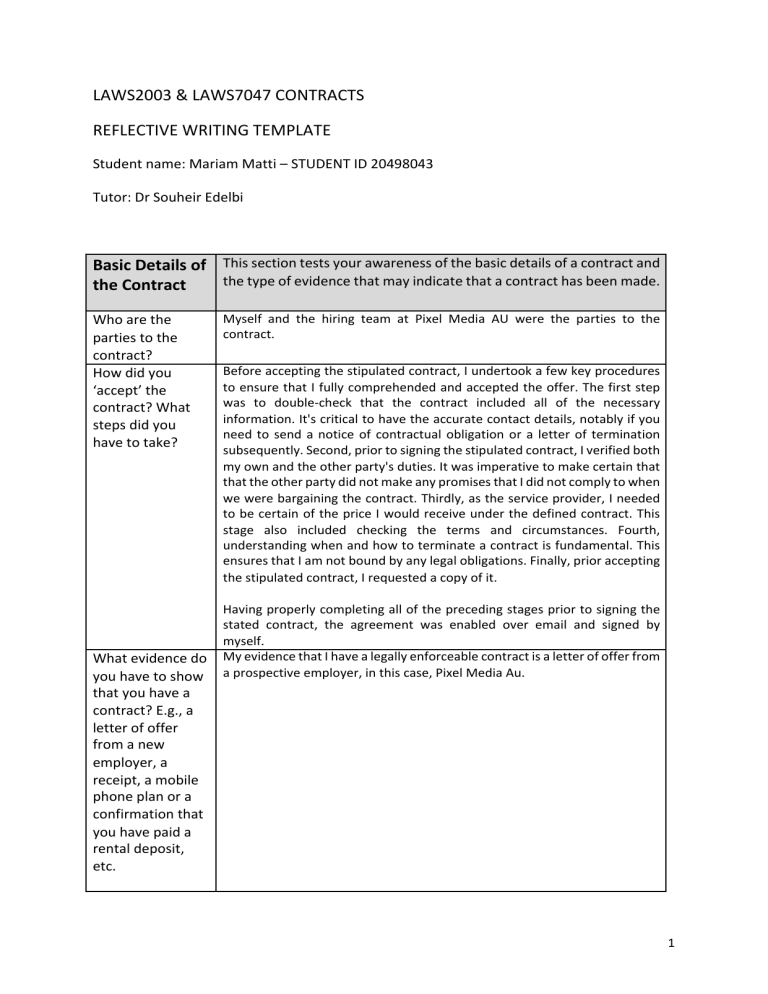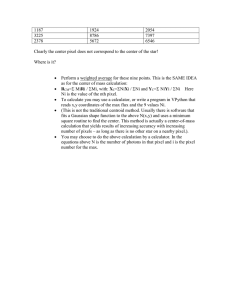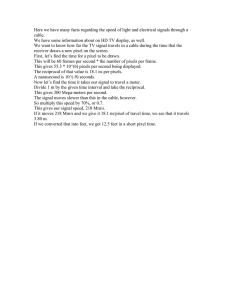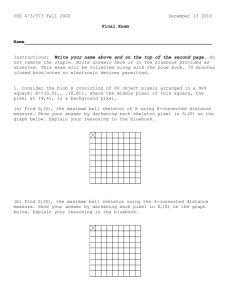
LAWS2003 & LAWS7047 CONTRACTS REFLECTIVE WRITING TEMPLATE Student name: Mariam Matti – STUDENT ID 20498043 Tutor: Dr Souheir Edelbi Basic Details of This section tests your awareness of the basic details of a contract and the type of evidence that may indicate that a contract has been made. the Contract Who are the parties to the contract? How did you ‘accept’ the contract? What steps did you have to take? What evidence do you have to show that you have a contract? E.g., a letter of offer from a new employer, a receipt, a mobile phone plan or a confirmation that you have paid a rental deposit, etc. Myself and the hiring team at Pixel Media AU were the parties to the contract. Before accepting the stipulated contract, I undertook a few key procedures to ensure that I fully comprehended and accepted the offer. The first step was to double-check that the contract included all of the necessary information. It's critical to have the accurate contact details, notably if you need to send a notice of contractual obligation or a letter of termination subsequently. Second, prior to signing the stipulated contract, I verified both my own and the other party's duties. It was imperative to make certain that that the other party did not make any promises that I did not comply to when we were bargaining the contract. Thirdly, as the service provider, I needed to be certain of the price I would receive under the defined contract. This stage also included checking the terms and circumstances. Fourth, understanding when and how to terminate a contract is fundamental. This ensures that I am not bound by any legal obligations. Finally, prior accepting the stipulated contract, I requested a copy of it. Having properly completing all of the preceding stages prior to signing the stated contract, the agreement was enabled over email and signed by myself. My evidence that I have a legally enforceable contract is a letter of offer from a prospective employer, in this case, Pixel Media Au. 1 Key features of the Contract This section begins to test your awareness of the different ways a contract may be formed and how to identify some key features of a contract. Did you have to sign the contract or was it a wholly verbal agreement? How did you know what the terms of the contract were? Were they clear and easy to find/understand? Was there anything else about the As noted previously in the Job Offer from Pixel Media AU, I was requested to "read and sign the contract attached to the email to confirm that [I] agree to the proposed terms and conditions." As a result, the agreement was entirely written and required signature before the employment offer could be accepted. Terms and conditions are an integral component that ensures partners of legal duties and privileges. In my case, the agreement's terms and conditions were clearly stated under "Section 4 - Terms AND Conditions." Additionally, the terminologies are written in a bold pen that communicates the definitions simply. Among the agreement's terms were "terminate clauses, secrecy clauses, indemnity clauses, and interpretation clauses." The contract was straightforward and simple to comprehend. However, given that the company is a cinematography one (Pixel Media AU), I found the "Legal Guide for Videographers and Videography Businesses" quite 2 contract that you found interesting or challenging? E.g., font size, o be signed format, ferlanguage, images, etc? Context and Background interesting. This part provided a step-by-step instruction describing everything a new employee needs to be aware of asabout videography from an Australian legal perspective. It was fascinating to see samples of films and photographs illustrating a trademarked or copyrighted production. Additionally, it was interesting to see a whole section devoted to "How to Secure Videos on Websites and/or Social Media." Knowing how to protect digital videos placed on the site from being stolen or used outside (Pixel Media AU's) authorisation was not only intriguing, but also highly useful. Additionally, the only stumbling block was the contract's Videography terminology. Although terms such as "camera body, mirrorless camera, bokeh, and raw files" were initially difficult to comprehend, they got easier over time.master and utilise over time. This section begins to test your ability to recognise the broader social or economic context in which a contract is made and the role that inequality of bargaining power plays in contracts. What were the underlying circumstances surrounding your decision to enter the contract? This could be work or family-related or there might be a personal or social dimension to the contract. I selected to enter the stated contract since I've always had a genuine interest in the wedding sector, notably videography, as I also work in a wedding reception. I also conducted extensive research prior to choosing this organisation, and it appeared to have an excellent reputation as well as an outstanding corporate culture and long-term career potential opportunities. As a result, I felt that this professional path aligned with both my self interests and work objectives. What opportunity was there to negotiate the terms of the contract? I had numerous opportunity to renegotiate contract provisions that were detrimental to my interests. One concession I made was to work only Wednesdays and Fridays, rather than five days a week, to accommodate my university studies. The hiring team's head was quite accommodating, and they were pleased to continue with the contract despite the fact that I adjusted the hours for which they need my services. As noted previously, I did negotiate for more convenient office hours to accommodate my university's studies. The head office was delighted to proceed with my revisions. I also attempted to negotiate the payment schedule to be weekly rather than biweekly. However, the head office rejected my argument and was adamant on paying biweekly rather than weekly. One way I could have avoided the contract was to refuse to sign the contract that was emailed to me. As a result, no legally enforceable agreement would have been made from the start. Additionally, to terminate the relationship, Myself or any other party seeking to terminate the deal must send a letter requesting termination. This section begins to test your ability to adequately reflect upon the process by which a contract is made. It also begins to test your ability to critically engage with the hidden assumptions and power structures that shape how Did you negotiate any terms other than price? What could you do to avoid or get out of the contract? Reflection and analysis 3 What surprised you about the contract and why? Were you able to meet all your contractual obligations or did you encounter obstacles? What were they? What are some hidden or unstated assumptions you think the contract is based on? You may wish to refer to the theoretical assumptions we discussed in week 2. E.g., freedom of contract, raceneutrality, gender subordination etc. From your perspective, was the contract fair? Explain Pick one of the theoretical perspectives or critiques we discussed in week 2 and describe how it applies, relates to, or informs your a contract is made and implemented. In addition, we test your ability to link theory and critique to practice. Accordingly, to complete this section, you should draw out some general conclusions about the contract based on the theories, critiques, and relevant legal principles that we have studied to date. What astonished me the most about the agreement was that it was not drafted by a lawyer but by the company's director. Additionally, I was startled to learn that each contract contains a plethora of specifics that can be bargained. You may not always get your way due to the other person's or business's negotiating strength. Even if you are rejected, you should make an attempt to have the agreement modified to be more beneficial to your viewpoint. You might be shocked at how much you can bargain simply by asking. Even though it was difficult to complete all assigned obligations due to my lack of cinematography expertise prior to accepting the stipulated contract, I was able to do so. Among my responsibilities were scheduling, verifying, and attending activities on time, emailing and/or contacting customers regarding cinematography services for their special date, and operating from the workplace every Wednesday and Friday from 8:00 AM to 5:00 PM. The structural partition of marginalisation from one gendered to the other is the subjection of women in society to men. Almost every facet of organisations is governed by a framework of patriarchy influence and conduct that restricts women's capacity to interact and progress above what they have created. The contract establishes formal and informal rules that control gender interactions and assign work, values, duties, and demands differently between men and women. Thus, it is considered that the provided contract contains gender subordination. The arrangement between myself and Pixel Media AU is simply fair and equitable for both parties. The binding contract is transparent, proving that the conditions are stated in relatively simple language, and are easily accessible to any person impacted by the agreement. According to the promise hypothesis, contract formation begins with the issuing of a promise. This suggests that it considers contract formation as being mostly determined by the voluntary conduct of petitioners rather than by third parties such as the Government. The promise theory assists by emphasising that the contract's foundation is the promises exchanged between the parties previous to the contract's implementation. To connect it to the current situation, it was requested that one of the contract's clauses be amended. When Pixel Media Au managed to negotiate the amendments/changes (a promise to comply), this became one of the fundamental tenets of the existing agreement that I and Pixel Media Au eventually signed. 4 understanding of the contract? Based on your current state of knowledge, is the contract significant from a legal point of view? Why? Why not? Having had this experience, will you do anything differently in future when making or entering an agreement? Explain Contracts serve as a trustworthy recording of the participants' assets, duties, and liabilities. Businesses can allocate and mitigate risk by utilising agreements in this manner, as there is a level of certainty and transparency regarding who is accountable. A company can then use this essential information to enhance future business choices. Additionally, the purpose to be contractually obligated is a necessary element of any agreement, and it needs that both parties have this intent in order for the contract to arise and be enforceable. This implies that, unlike similar, less official pledges, a contractual promise is one that you have the constitutional authority to ensure in court, generally if another party has violated the contract agreement and incurred you a type of loss. I personally would not do or change anything. My contract with Pixel Media AU is entirely reasonable and beneficial to both sides. The binding contract is clear, proving that the conditions are stated in reasonably simple words, are visible, are displayed, and are widely available to any individuals affected by the agreement. That a result, when I enter or create a new agreement, I will follow the same processes as I did when I entered this one. Is there anything you wish to tell the Subject Coordinator about the nature of this assessment? Was it useful, enjoyable or challenging etc? All I'm going to say is that I'm quite appreciative of this assessment, particularly as a first-year student. It was a fairly simple and basic evaluation that the majority of students in this course probably enjoyed. It was an enjoyable, especially because I was able to apply and use a contract that I had signed. Once again, many thanks. 5




